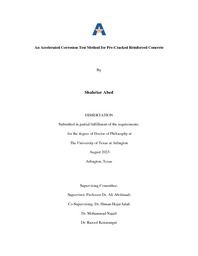| dc.description.abstract | Reinforced concrete (RC), a composite material combining the strength of concrete and the tensile strength of steel reinforcement, has significantly transformed the field of civil engineering and contributed to the advancement of modern infrastructure. Reinforced concrete structures are susceptible to deterioration over time despite their numerous advantages. One of the primary factors leading to the degradation of RC is the corrosion of steel reinforcement, primarily caused by exposure to aggressive environmental elements such as chloride ions, carbonation, and moisture. This dissertation aims to provide valuable insights into the accelerated corrosion behavior of steel bars embedded in concrete, considering factors such as crack size, chloride solution concentration, applied voltages, and the potential effects of autogenous healing.
This research's evaluation of corrosion rates relies on several methods, including Half-Cell Potential measurements, Weight Loss analysis of steel specimens, and elemental analysis of steel samples. The study comprises two phases: the first focuses on the accelerated corrosion of steel wires, while the second investigates accelerated corrosion on steel bars embedded in concrete.
In the first phase, 108 steel rebars were immersed in three different solution concentrations (2,000 ppm, 30,000 ppm, and 100,000 ppm) and subjected to six levels of applied voltages (0, 2, 4, 8, 12, and 16 Volts). The corrosion rate was determined by measuring weight loss over 14 days to identify critical voltage levels. The results indicate that increasing the applied voltage accelerates the corrosion process, with higher voltages (12 and 16 Volts) resulting in more significant weight loss and corrosion than lower voltages. Notably, after five days of testing, some rebars were no longer suitable for further analysis.
The second phase expands on the promising outcomes from the first phase by examining the accelerated corrosion on steel bars embedded in concrete specimens with varying crack sizes, concentration solutions, and voltages. A total of 1080 reinforced concrete cylinders were subjected to three different crack widths (0.01", 0.03", 0.05", and 0.1"), three voltage levels (2, 4, and 8 Volts), and three solution concentrations (2,000 ppm, 30,000 ppm, and 100,000 ppm). Monthly testing throughout six-month was conducted to evaluate the influence of crack size, voltage levels, and solution concentration on the corrosion behavior of the embedded steel bars. Half-cell potentials, per ASTM-C876 standards, were recorded, and the weight loss of the steel bars was measured monthly to quantify the corrosion level. Additionally, scanning electron microscopy (SEM) and energy-dispersive X-ray spectroscopy (EDX) analyses were performed to assess the levels of corrosion and oxidation in each sample.
In summary, the research seeks to predict the deterioration of reinforced steel structures and estimate the service life of concrete pipes in real-world conditions. This is achieved through accelerated corrosion studies, load-bearing capacity assessments, and applying the Arrhenius concept for extrapolation and projection. | |


